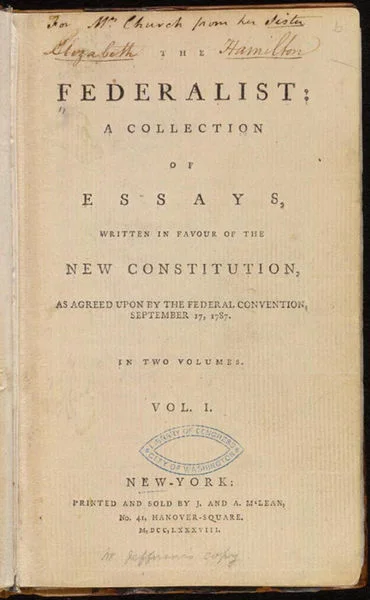Federalist #13 - Alexander Hamilton - Federalist Fridays
In Federalist #13, Alexander Hamilton discusses the economy of separate governments for the 13 States as opposed to one National Government.
If you’ve missed any of our previous Federalist Fridays reviews, you can see the list here.
Federalist #13
Alexander Hamilton
November 28, 1787
Advantage of the Union in Respect to Economy in Government
Federalist #13 is the shortest Paper written so far. It contains two long paragraphs and two short paragraphs, in which Alexander Hamilton argues that a National Government is the most economical means of monitoring the commerce and welfare of the United States.
Paper #13 discusses how the option of the States uniting under separate governments will ultimately end up with only two adversarial nations.
This, in essence, would be a waste of money.
Three Confederacies
Several weeks ago, I discussed how John Jay repeatedly referenced ‘three or four separate confederacies.’ I asked you, the reader, what States you thought might unite together.
Well, apparently, I forgot Federalist #13. I’ll be honest, this is a fairly insignificant Paper and I haven’t read it in at least fifteen years. Truthfully, #13 is so short and irrelevant that if I had not made this mistake, there wouldn’t be much to say about it at all.
I bring this up because Hamilton pretty clearly answers our question:
“The ideas of men who speculate upon the dismemberment of the empire seem generally turned toward three confederacies--one consisting of the four Northern, another of the four Middle, and a third of the five Southern States.”
With this line, our question is answered:
Confederacy One: New Hampshire, Massachusetts, Rhode Island, Connecticut
Confederacy Two: New York, New Jersey, Pennsylvania, Delaware
Confederacy Three: Maryland, Virginia, North Carolina, South Carolina, Georgia
Summary
Hamilton’s main point in Federalist #13 is that separate confederacies will be a waste of money and resources.
Two governments, for example, would necessitate twice the amount of people needed to hire for standard operations. Additionally, the cost of monitoring borders would be substantial.
He goes on to discuss how the three confederacies described above would more than likely end up as just two. New York, wise enough to not leave a powerful New England nation at its border, would join them. Pennsylvania, New Jersey and Delaware would then follow suite.
The Anti-Federalist Argument
There is not much for an Anti-Federalist to argue against in this article.
I would suppose the best rebuttal would be to say ‘yes, it might cost more, but that’s the price of freedom.’
In essence, one might say that just because something is more economical does not mean it is the best policy. Cheaper is not always better.
To read about other Federalists, check out these articles about Theophilus Parsons and Thomas Pinckney.
If you are looking for a good book, I am currently reading ‘First Founding Father’ by Harlow Giles Unger. This book about Richard Henry Lee can be picked up through the Amazon affiliate link below. While I do get a small commission, the price does not change for you so making a purchase here is an easy way to support this site.
If you are new here, make sure you subscribe to our email list for a new Founder every day.






